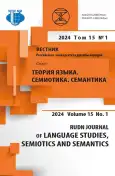Mechanisms of Understanding: Nikolay A. Rubakin’s Mnema Theory
- 作者: Bubnova N.A.1
-
隶属关系:
- RUDN University
- 期: 卷 15, 编号 1 (2024)
- 页面: 38-50
- 栏目: GENNADY PROKOPIEVICH MELNIKOV: TO THE 95TH ANNIVERSARY
- URL: https://journal-vniispk.ru/2313-2299/article/view/323638
- DOI: https://doi.org/10.22363/2313-2299-2024-15-1-38-50
- EDN: https://elibrary.ru/DBKNGO
- ID: 323638
如何引用文章
全文:
详细
The study provides a brief overview of the Mnema Theory, a bibliopsychological theory based on the achievements in physiology and evolutionary biology formulated by Russian bibliographer, book critic, popularizer of science and writer Nikolai Alexandrovich Rubakin (Nicholas Rubakin), and the one which allows consistently and vividly reveal the structure of the human psyche, and show the mechanisms associated with understanding in general and understanding words and text, in particular. The Theory of Mnema, although presented to the scientific community at the beginning of the 20th century, is nevertheless highly relevant after a hundred years, and there continues to be more and more evidence pointing to the veracity and credibility of its provisions from modern humanitarian and natural sciences. Nikolay A. Rubakin’s Theory of Mnema is formulated on the basis of three laws of bibliopsychology: Zemon’s Law, Humboldt-Potebnya’s Law and Teng’s Law, and shows the structure of the human psyche in the form of mnema, which is a system of records received from external stimuli. According to Nikolay A. Rubakin’s theory, the mnema are a complex open system that is in a state of permanent development, and is always being added to and is continually changing. The complex composition of the reader’s mnema determines the perception and interpretation of a text, which is also understood as the external stimulus that generates a set of engrams and their activation leading to their subsequent ecphorias, as well as the projections that a reader receives when understanding texts. The validity of Nikolay A. Rubakin’s Theory of Mnema is confirmed by psychophysiological experiments aimed at measuring the semantic proximity of words (experiments of A.R. Luria and O.S. Vinogradova), psychological and psycholinguistic experiments (for example, Rorschach tests and various kinds of associative experiments), as well as the achievements of the philological science itself with regard to the study of the space of artistic and non-artistic text, the actual images of the author and the characteristics of the interpretations of the text by readers and researchers.
作者简介
Natalia Bubnova
RUDN University
编辑信件的主要联系方式.
Email: bubnova-na@rudn.ru
ORCID iD: 0000-0002-8293-1399
SPIN 代码: 9065-7172
Researcher ID: AAA-1513-2019
PhD in Philology, Senior Lecturer of the Department of General and Russian Linguistics, Faculty of Philology
6, Miklukho-Maklaya str., Moscow, Russian Federation, 117198参考
- Rubakin, N.A. (1977). Psychology of the Reader and Books: a Brief Introduction into Bibliological Psychology. Moscow: Kniga. (In Russ.).
- Borodina, V.A. (2018). Bibliopsychology in Culture of Textual Activity. Bulletin of the St. Petersburg State Institute of Culture, 3(36), 137–141. (In Russ.).
- Borodina, V.A. (2022). Today’s Library Psychology in the Context of N.A. Rubakin’s Legacy. Sphere of Culture, 2(8), 91–100. https://doi.org/10.48164/2713-301X_2022_8_91 (In Russ.).
- Leont’ev, A.A. (1977). About N.A. Rubakin. In: Rubakin N.A. The Psychology of the Reader and Books: a Brief Introduction to Bibliological Psychology. Moscow: Kniga. pp. 3–5. (In Russ.).
- Sorokin, yu.A. (1977). The Bibliopsychological Theory of N.A. Rubakin. In: Rubakin N.A. Psychology of the Reader and Books: a Brief Introduction to Bibliological Psychology. Moscow: Kniga. pp. 6–15. (In Russ.).
- Kruk, T.K. (1962). Nikolay Aleksandrovich Rubakin. In: Rubakin N.A. How to Engage in SelfEducation. Moscow: Sovetskaya Rossiya Publ. pp. 3–28. (In Russ.).
- Rubakin, N.A. (1975). Studies About the Russian Reading Public. In: Rubakin N.A. Favorites: in 2 vols. Vol. 1. Moscow: Kniga. pp. 33–104. (In Russ.).
- Rubakin, N.A. (1975). Among the Books. In: Rubakin N.A. Favorites: in 2 vols. Vol. 1. Moscow: Kniga. pp. 107–211. (In Russ.).
- Rubakin, N.A. (2006). Bibliological Psychology. Moscow: the Triksta Academic Project. (In Russ.).
- Rubakin, N.A., (1967). Rubakin (Guide of the Sea of Books). Moscow: Molodaya Gvardiya. (In Russ.).
- Rorschach, G. (2003). Psychodiagnostics: Methodology and Results of a Diagnostic Experiment to Study Pperception (Interpretation of Random Images), V.I. Nikolaev (Tr.), Moscow: Kogito-Center. (In Russ.).
- Valentinova, O.I. & Nikitin, O.V. (2022). Cognitive World View from Ideological Perspective of Linguistic Dictionary Entries (based on Material from Encyclopaedia “Russian Language”, first edition). Issues of Cognitive Linguistics, 2, 119–128. https://doi.org/10.20916/1812-32282022-2-119-128 (In Russ.).
- Valentinova, O.I. (2022). Imaginative Thinking in Science (Based on the Material of V.O. Klyuchevsky’s Essay “The History of Russia”). Philological Sciences. Scientific Essays of Higher Education, 4, 48–57. https://doi.org/10.20339/PhS.4-22.048 (In Russ.).
- Valentinova, O.I. & Van, Lele (2020). Manifestation of the Author’s Image Category in the Characteristics of the Reign of Peter the Great (Based on the Material of V.O. Klyuchevsky “Russian History”). RUDN Journal of Language Studies, Semiotics and Semantics, 11(4), 775–789. https://doi.org/10.22363/2313-2299-2020-11-4-775-789. (In Russ.).
- Bakhtikireeva, U.M. & Valentinova, O.I. (2022). “Language Thinking” from the Perspective of System Linguistics. Russian Journal of Linguistics, 26(1), 224–244. https://doi.org 10.22363/2687-0088-30149 (In Russ.).
- Luria, A.R. & Vinogradova, O.S. (1971). Objective Study of the Dynamics of Semantic Systems. In: Semantic Structure of the Word, Psycholinguistic Studies. Moscow. pp. 27–63. (In Russ.).
- Vinogradova, O.S. & Eisler, N.A. (1959). Identification of the System of Verbal Connections in the Registration of Vascular Reactions. Voprosy Psychologii, 2, 101–117. (In Russ.).
- Leontiev, A.A. (1971). Psychological Structure of Meaning. In: Semantic Structure of the Word, Psycholinguistic Research. Moscow. pp. 7–19. (In Russ.).
- Luria, A.R. (1979). Language and Consciousness. Moscow: Moscow University Press. (In Russ.).
- Arutyunyan, V.G. (2013). Associative-Semantic Network Principle of Human Mental Thesaurus Organization. Bulletin of Immanuel Kant Baltic Federal University: Philology, Pedagogy, and Psychology, 11, 128–134. (In Russ.).
补充文件









